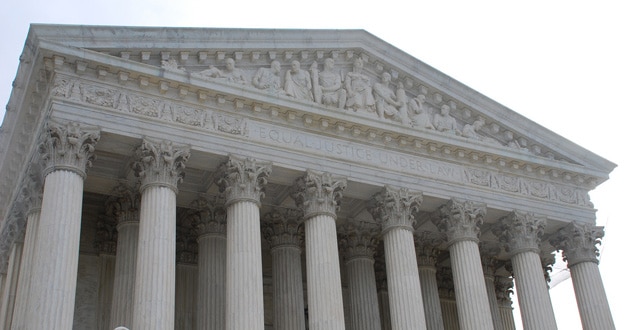In October, the Supreme Court Justices heard oral arguments regarding assertions of transgender discrimination in the workplace related to the meaning of “sex” in federal employment law (Title VII). The specific question before the court was: “Whether Title VII prohibits discrimination against transgender people based on (1) their status as transgender or (2) stereotyping under Price Waterhouse v. Hopkins….”
The case hit the U.S. Supreme Court after the U.S. Court of Appeals for the 6th Circuit effectively read protections against “sex” discrimination to include gender identity. Attorneys for ADF appealed the case to the U.S. Supreme Court arguing, among other things, that the U.S. Congress did not intend “sex” to mean anything beyond discrimination against women (as compared with men) and that if Congress wants to include “gender identity” in Title VII, it must explicitly do so, as opposed to the courts usurping their constitutional authority by changing the meaning of the law by fiat. Such judicial “legislation” usurps the Separation of Powers mandated by the U.S. Constitution.
The basic relevant facts are that a biological man, Stephens, was terminated at Christian Funeral home for violating the dress code after he announced his female gender identity to his employer and announced he would start dressing as a female at work. While it is difficult to predict what the court will do from the questions and comments during oral arguments, it appears that nine justices were generally divided on ideological lines.
The Law of Bathrooms? Oral arguments began with a prolonged discussion of the controversial and sensitive issue of biological men using women’s bathrooms. Chief Justice Roberts, Justice Alito, and even Justice Sotomayor, all appeared to be concerned about the practical impacts of this on women’s privacy and whether, if Stephens (a biological male) had been explicitly terminated for entering the women’s restroom at work, this could also, in addition to the dress code issue, be a violation of Title VII. Although this specific issue wasn’t implicated in this case, the court was very interested in discussing it, nonetheless.
Unfair Competition for Women? Beyond the bathroom privacy and safety issues. Court watchers have speculated that Ruth Bader Justice Ginsberg, a longtime advocate of Women’s rights, may find herself conflicted here. Indeed, during oral arguments, Justice Ginsberg appeared concerned about the impact of allowing transgender men (biological males) to compete against women in college sports. Redefining sex to include “gender identity” is profoundly unfair to women and girls because it forces them to compete in sports with biological men and boys. Forcing women to compete with men may erase many of the advances women have achieved. Authentic feminists should be upset and are upset. In fact, a prominent feminist filed an amicus brief in strong opposition to expanding Title VII to include gender identity.
Creative Reasoning? In an attempt to side-step the charge that they were demanding an illegitimate judicial re-write of Title VII to include gender identity, Stephens’ counsel cleverly argued that his client was terminated “because of sex,” since, now as a (transgender) “female,” he no longer conformed to gender stereotypes related to his male “sex assigned at birth.” But this is a distinction without a difference. Clearly Stephens wanted to dress at work in a manner inconsistent or contrary to his male biological sex precisely and only because of his newly discovered “female” transgender identity. Stephens was terminated because he is a biological man dressing like a woman—because he is transgender, which doesn’t fall under Title VII, unless amended by the U.S. Congress. Attorney John Bursch for Alliance Defending Freedom did a terrific job arguing the case.
A Close Question Textually? Indeed, Justice Gorsuch surprised conservatives when he appeared to possibly concede that whether “sex” includes “gender identity” is a close question textually. The solicitor General Noel Francisco responded that he didn’t agree it was a close case for three reasons. First, biological sex and gender identity are different traits (as is recognized in other state and federal statutes). Second, discrimination is judged by whether you are treating a similarly situated person of the opposite sex differently because of their sex (thus, the proper comparison would be is Stephens as a transgender man being treated differently than a similarly situated transgender woman being treated). Third, the court’s broadening of “sex” to include sexual orientation and gender identity gives a complete victory to one side without allowing balance to protect religious freedom, which is normally worked out in the legislative process. To his credit, Justice Gorsuch, as a matter of judicial modesty, remained concerned with judges deciding this issue, rather than the legislature, because of the social upheaval that it might cause.
Transgender Sex Stereotypes? A genuine challenge for conservative Justices who may want to limit the definition of “sex” is the Price Waterhouse v. Hopkins case from the 1980s. There, the court included sex stereotypes in the definition of “sex” under Title VII. This allowed counsel for Stephens to argue that his client was terminated because of Harris’ sex stereotypes regarding how transgender women (biological men) should dress in the workplace. But even in Price Waterhouse, the facts were about how an aggressive biological woman was being treated compared to aggressive biological men, not how a transgender woman (biological man) is being compared to transgender men (biological women). If the court expands Price Waterhouse to all possible gender and sexual stereotypes, we could lose this case. But a loss will have broad negative social impacts.
Among them, the privacy and safety of women and girls will be eroded as they will increasingly be forced to share bathrooms and other private spaces with biological men and boys. Fairness in sports will be undermined as women and girls are forced to compete with biological men and boys. Religious free exercise and free speech are threatened as the government will increasingly coerce employers and individuals to believe and say things about other individuals (i.e. use sex-specific names or pronouns) according to one’s subjective gender identity rather than objective biology. Governmentally-mandated gender confusion is not freedom, it is tyranny.
Biology is like gravity. It’s baked into the way things are. Our recently discovered subjective beliefs about sex and sexuality can’t change biology’s objective immutable nature—there are only two genders. Our foolish attempts close our eyes to biological reality and our growing commitment to erase the gender binary of male and female and replace it with a near limitless gender spectrum will have far-reaching negative impacts on our society. It will impact not only religious freedom and the freedom of speech, but will also have devastating effects, especially for women and girls, who have only relatively recently enjoyed significant advances. We shouldn’t mess with mother nature. If we do, we may surely live to regret it.
— by Dean R. Broyles, Esq.
Broyles is a constitutional attorney serving as the President of The National Center For Law & Policy (NCLP), an organization fighting to promote and defend religious freedom. Copyright© The National Center For Law & Policy. Reprinted with permission.


